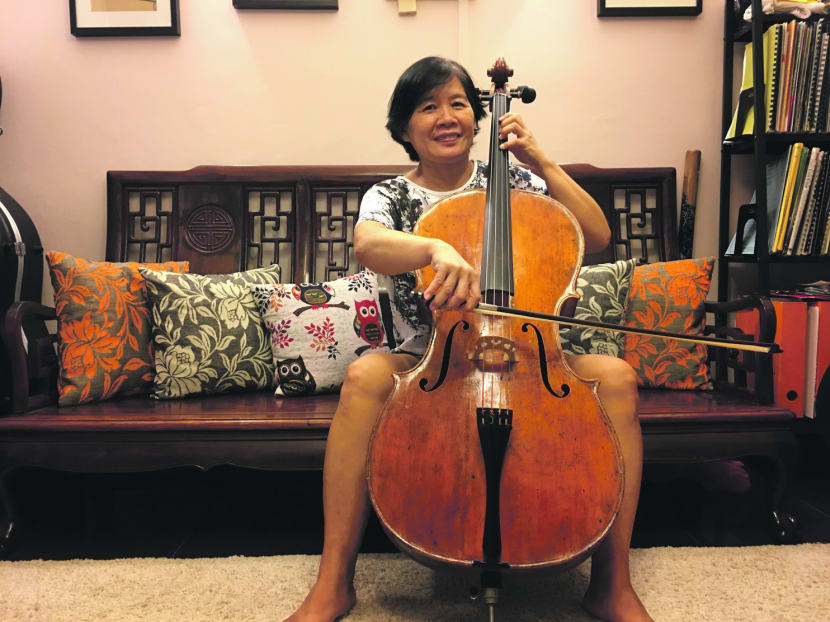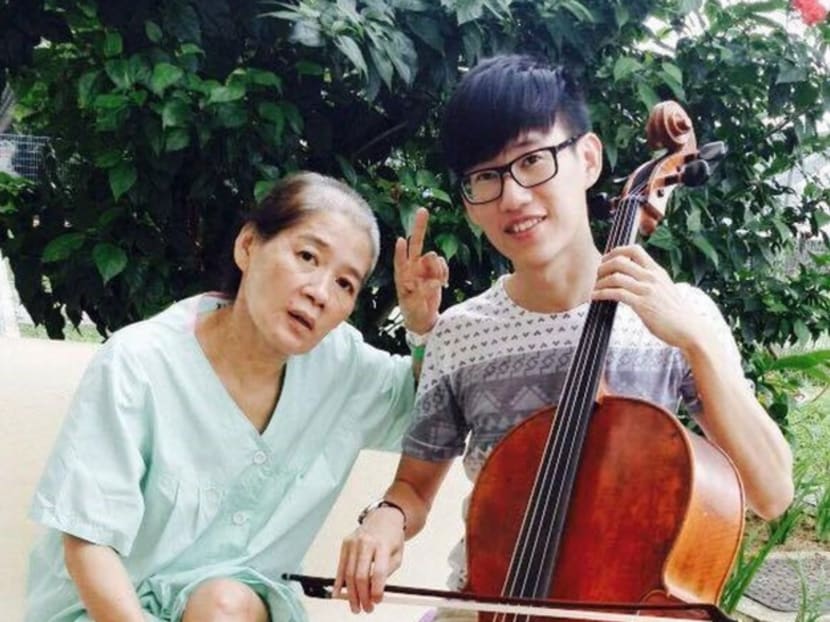Hello, cello! How the strings helped one stroke patient bounce back
SINGAPORE — A cello, said Wong Cher Moi, was instrumental in her recovery from a stroke. Wong, 53, a homemaker, had enjoyed perfect health until she collapsed at home one day in October 2014.


SINGAPORE — A cello, said Wong Cher Moi, was instrumental in her recovery from a stroke. Wong, 53, a homemaker, had enjoyed perfect health until she collapsed at home one day in October 2014.
When she was taken to the hospital, doctors diagnosed her with Moyamoya disease, a rare blood disorder symptom that affects blood vessels in the brain. When Wong woke after a four-hour surgery, she found herself helpless and weak — she had no strength in her fingers and she had difficulty balancing.
Her two sons — cello teacher Hughes Chong Mu He, 28, and businessman Adam Chong Jin Hai, 29 — were devastated.
“She was able to instantly recognise me but she couldn’t recognise my brother when she woke up. To help her remember, I showed her Facebook pictures of our trip to China in 2013 and also read heartwarming messages written by my music students to her, but to no avail,” said Hughes.
But Hughes, who lives with his mother, remembered how he had taught his mother to play the cello at the age of 50, and how much she loved playing. In fact, it was at one of his performances at a student recital in 2012 that had led to her interest in the cello. He had then offered to help teach her how to play, and she had even performed on stage at a student recital Hughes had organised.
“I liked the sound of the music, that’s why I started playing,” said Wong, now fully recovered, who spoke to TODAY during an interview in her Jurong West flat.
While she was under observation at National University Hospital, Hughes decided he would see if music could help her.
“I smuggled the cello (into the hospital) and took her to the car park to play for her, and see if she might react,” he recalled. “She would practice every day for one to two hours,” Hughes said, adding that she likes slow melodious and lyrical pieces from Chinese oldies.
When he handed her the cello to see if she wanted to try and play it, she was immediately able to assume the correct position and posture to play the instrument despite being physically weak.
Thus, with the cello, her road to recovery began. Hughes used videos and audio recordings of him performing to help her along and jog her memory about the music she had learnt.
Wong was discharged from hospital in April 2015, but was still very weak. She needed someone to help her shower and she was barely able to walk on her own.
But she was determined to get better, and used the cello to help train her memory and muscles.
She practiced every day on the cello, starting with children’s songs such as Twinkle Twinkle Little Star.
She practiced writing music notes for pieces, writing them over and over until she could remember each piece, Wong said.
There were no short cuts and it was not an easy road. Her hand movements were still restricted because of the stroke, and Wong found herself in deep despair.
“I cried when my fingers could no longer move as fast as they did before,” Wong said. Often, she became so frustrated that she would stop playing. Still, after one or two hours, she would pick up the instrument and try again.
In August 2015, after a year of outpatient care, doctors said that she had made a full recovery.
Wong set herself a new goal: To become proficient at all the pieces of music that she had learnt before her stroke.
Hughes, often had students coming to their Jurong West HDB flat, as he teaches from home.
The students would encourage Wong to keep going.
“They said to me ‘Auntie, don’t worry. Everything you are learning, we have also learnt from scratch. If you don’t know something, you can just ask me’,” Wong recalled fondly.
“I was so lucky to have so many encouraging people by my side.”
SET FOR THE STAGE
It has now been a year of intensive practice, and Wong feels she has truly regained her memory fully and complete motor movement, too. She has also moved onto newer pieces on the cello, and even taken her cello-playing skills to the stage. She performed at a small concert in June last year at the Drama Centre Theatre.
She is slated to perform next Saturday at a cello concert, A Night On Broadway, organised by Hughes.
She will be appearing as part of a group of 41 selected cellists.
The orchestra will feature songs from famous Broadway musicals such as Phantom of the Opera, Mamma Mia! and Beauty and the Beast.
Today, Wong says she has a lot to be thankful for.
“I feel very lucky. I want to thank the universe for giving me my two sons (who supported me throughout my recovery), as well as giving me this chance and opportunity to learn the cello,” she said.
“And Hughes has so many good students by his side who are willing to help one another. I feel very lucky to have all these people in my life,” Wong said.
For A Night on Broadway, Wong is most excited about a certain guest who will be attending the performance — the NUH doctor who was responsible for her outpatient care.
“We told him about the concert and he says he is very excited to watch her perform,” Hughes said.
“It’s been a hard path,” said Wong. But the cello has given her passion and hope for the future. Besides simply hoping for better health and for the success of her sons in their careers, “I also hope that cellography will grow and head towards a bigger stage”.
A Night on Broadway will be held on Feb 18 at 7.30pm at the Drama Centre Theatre. Ticket prices start at S$30 and are available from Sistic (www.sistic.com.sg).





